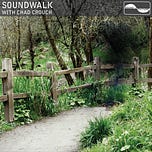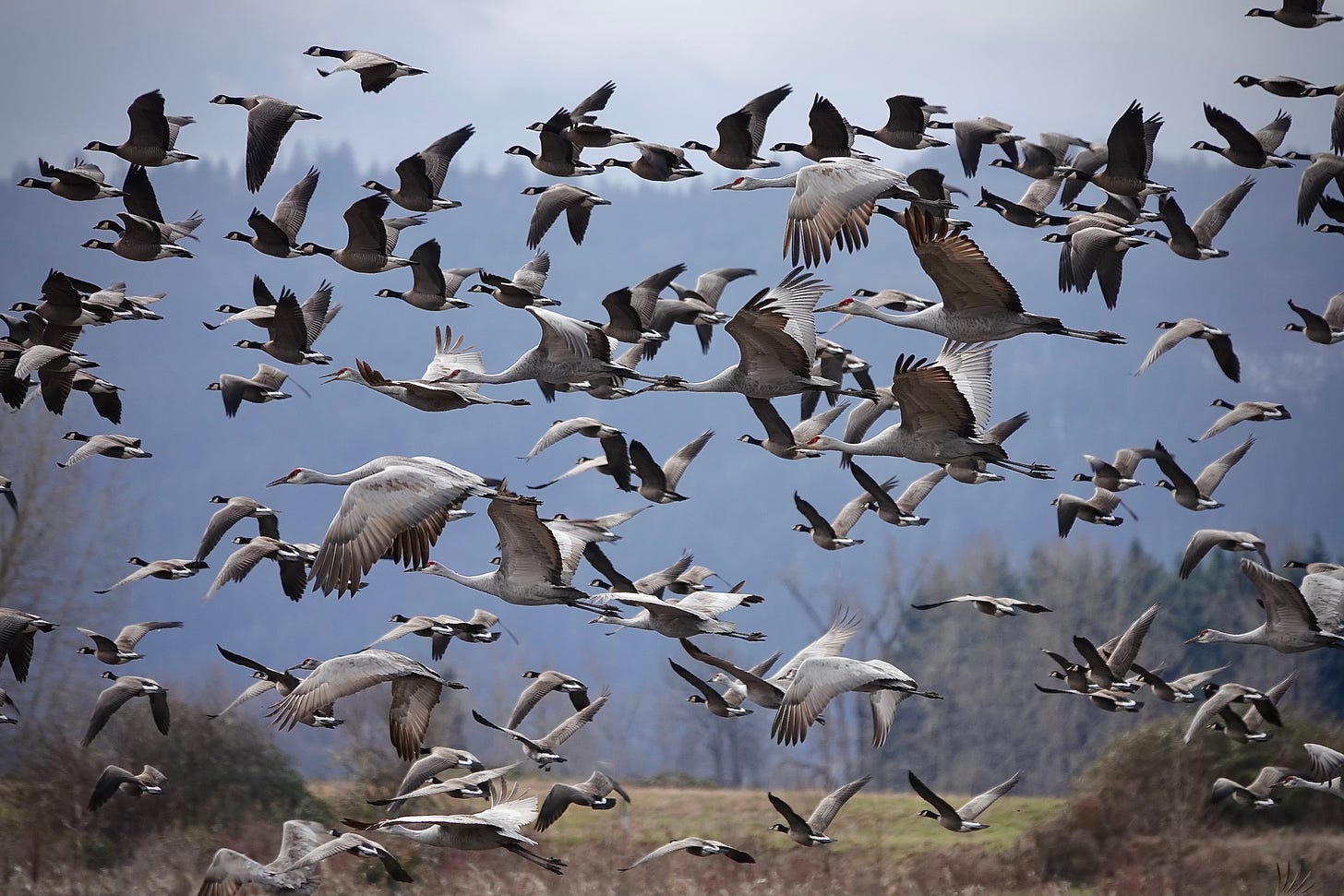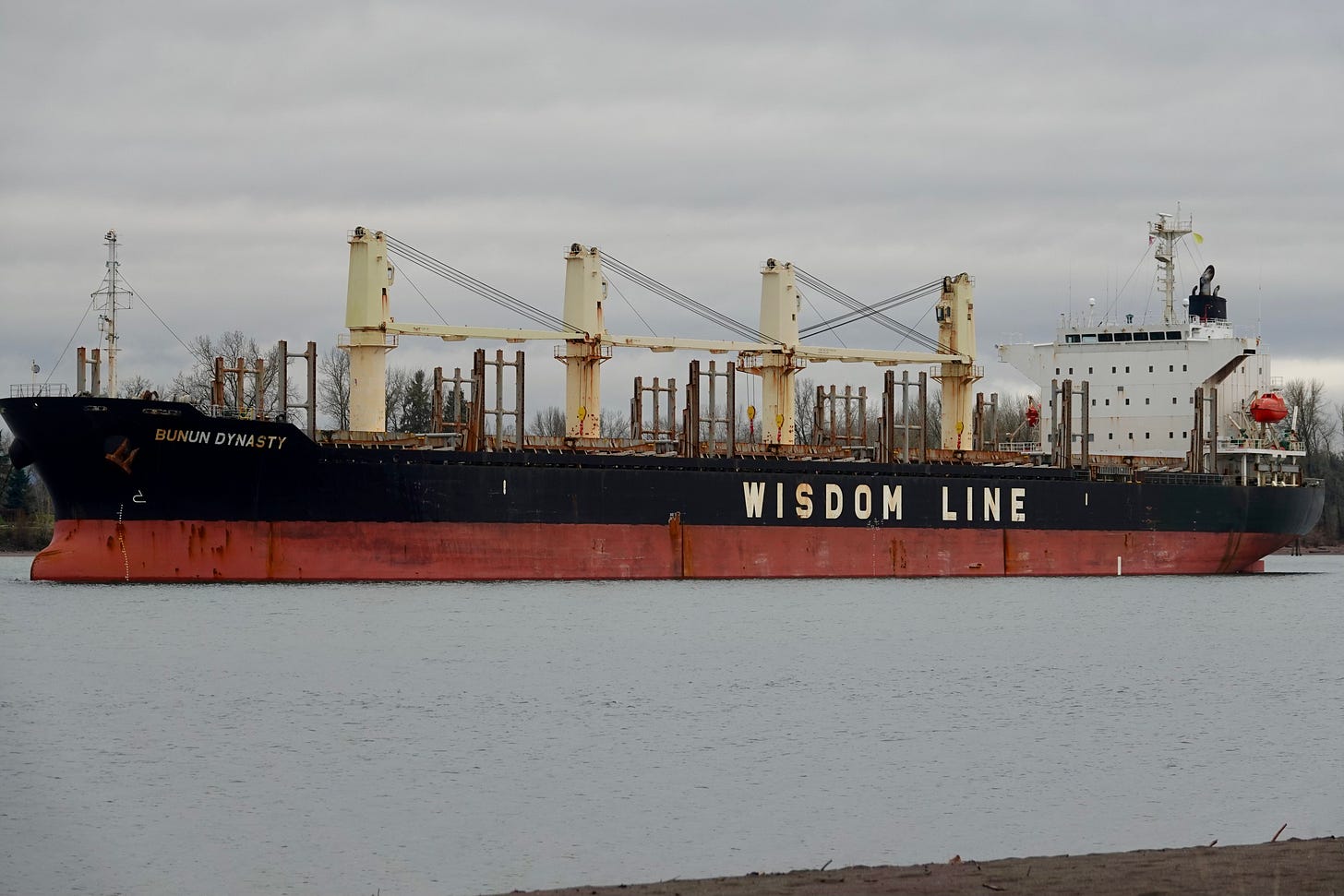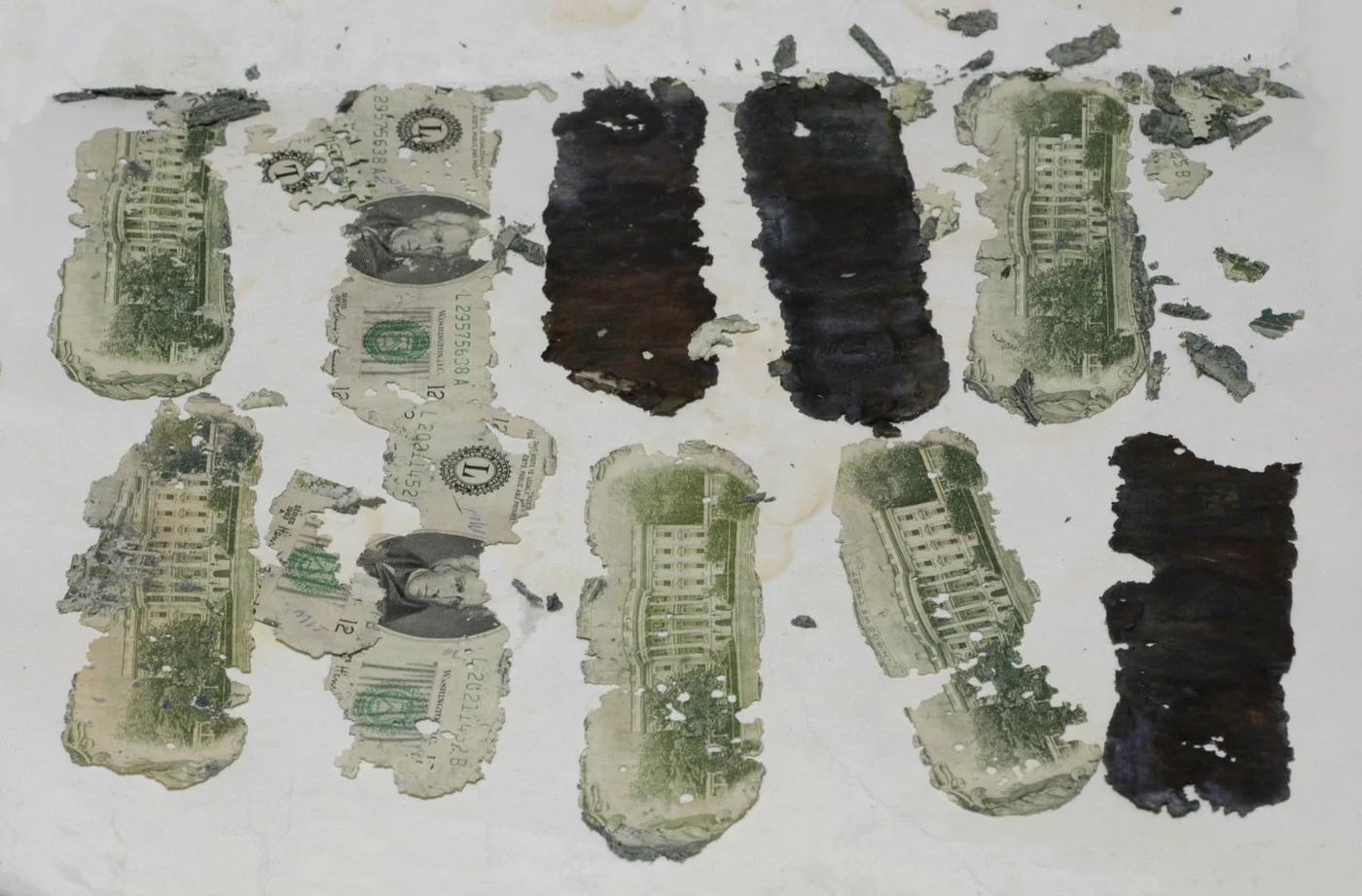The conclusion to the five-part Lower Columbia River soundwalk series brings us back to the Washington shoreline, three miles upriver from where we last visited, at a place called Frenchman’s Bar. Though it takes an hour by car to drive from Willow Bar to Frenchman’s Bar, they are literally just around the corner from each other on the water. And of course, this is how the birds experience it. Sandhill Cranes, Snow Geese, Canada Geese and others often overnight on Sauvie’s Island and forage by day across the river in The Vancouver Lowlands.
There are plenty of opportunities to capture fly-bys and fly-overs in field recordings here, but there is also plenty of competition in the soundscape from industrial sources. In addition to the planes, trains, and autos, you’ll often hear hulking cargo ships chugging by. If you listen closely you’ll hear a crew pounding on the hull of one such ship in the distance, close to the end of our soundwalk. I left it in, half because it was an interesting sound, and half because there’s only so much noise one can get rid of without messing it up. Incidentally, I also left in the subtle sound of me setting up a stationary recording rig. I’ll share that field recording next week on Soundscape, the companion podcast to Soundwalk, all linked up with this Substack newsletter. I visualize it like an H2O atom!
And maybe now is a good time to catch you up, since I don’t send emails as often as I’m posting. Recently I shared A Brief History of Soundwalks, taking a look at a couple examples of soundwalks, new and old, and arriving at a tentative answer to the question what is a soundwalk? (In the words of Christopher Robin, "It means just going along, listening to all the things you can't hear and not bothering.”) Also, I shared a soundwalk through the Black Artists of Oregon Exhibit at Portland Art Museum and field recordings of the charming American Dipper at Wildwood and some Trumpeter Swans and allies at Ridgefield NWR. Subscribers enjoy 5 min excerpts while premium subscribers get the complete recordings (10-90 min). Available in your podcast app and here.
For the Frenchman’s Bar Soundwalk score I used a lot of the same voices that we’ve been hearing in this batch. In particular, I try to follow the swells of sound from the abundant geese and cranes with synth pads and vibrating drones. This time I swap out the electric pianos for the intimacy and warmth of an acoustic piano and celeste. It’s both quiet and loud; a dynamic outing!
Frenchman’s Bar was named by Donald and David Scherruble who grew up in the area, heirs to the 120 acre farm that would become Frenchman’s Bar Park in the late 1990’s. The Scherrubles listened to their colorful "Old Frenchman" neighbor speak of his adventures when they were kids on the farm. Don Hamilton penned this story with an ear for the brothers’ lively storytelling for The Oregonian September 9, 1985:
Frenchman's Bar really has a French connection. That connection is the late Paul Haury, a Frenchman who once deserted a doomed ship,
Well before the turn of the century Haury, then 15, was an apprentice river pilot in France hoping to make his living on the sea. He signed on as a cabin boy on a wooden saling ship bound for Vancouver, British Columbia, via Cape Horn. It was to pick up a load of lumber and take it to the Sandwich Islands, now known as Hawaii. But the cabin boy who hoped to make his life sailng was treated poorly.
"He jumped ship, he did," David Scherruble said. "He used to come to the house and tell my mom and dad about how there was this big old hollow cedar tree and he hid in it while the searchers (from the ship) looked for him. They walked right past him, they did, and didn't even see him. That's the story he told."
After about three days the searchers gave up the hunt for their cabin boy and set off for Hawaii. In mid-Pacific the ship hit a fierce storm and went down with all hands.
For five years Haury's parents in France believed he was dead. By the time he wrote to tell them he hadn’t perished, he had made his way north from Vancouver and was working as a commercial fisherman in Alaska.
In 1915 Haury bought five or six acres along the Columbia and moved to the Vancouver area…
Interestingly, Haury, who died in 1937 while in his 70s, never saw the stretch of beach named for him. The bar was created by dredge spoils when the Columbia River channel was deepened by the U.S. Army Corps of Engineers in the late 1940s.
It might also be worth mentioning that Frenchman’s Bar is about a mile upriver from Tena Bar, which in 1980 provided a break in the infamous D.B. Cooper skyjacking mystery. A kid found $5800 in bundles of decomposing cash in the sand. Serial numbers on the bills matched those in the $200,000 ransom. (Funny how that seems like not so much today.) How did these bundles end up buried in the sand at Tena Bar? The FBI put a lot of energy into trying to answer that question but apparently few definitive conclusions could be drawn. There is absolutely no shortage of conjecture online. In 2020, a scientist ruled out quite a few timeline scenarios by testing the bills for diatoms. “Because the bills only had one season of diatoms on them, and did not have diatoms that bloom in the winter, Kaye theorizes that the money came out of the water and landed on the bank of Tena Bar after only a few weeks or months.”
Today the Tena Bar area, bound by a sand and gravel company, has No Trespassing signs posted every 10 meters.
Well, I guess that’s about it for this one. Thanks for being here with me.
Listen to this episode with a 7-day free trial
Subscribe to Soundwalk to listen to this post and get 7 days of free access to the full post archives.















